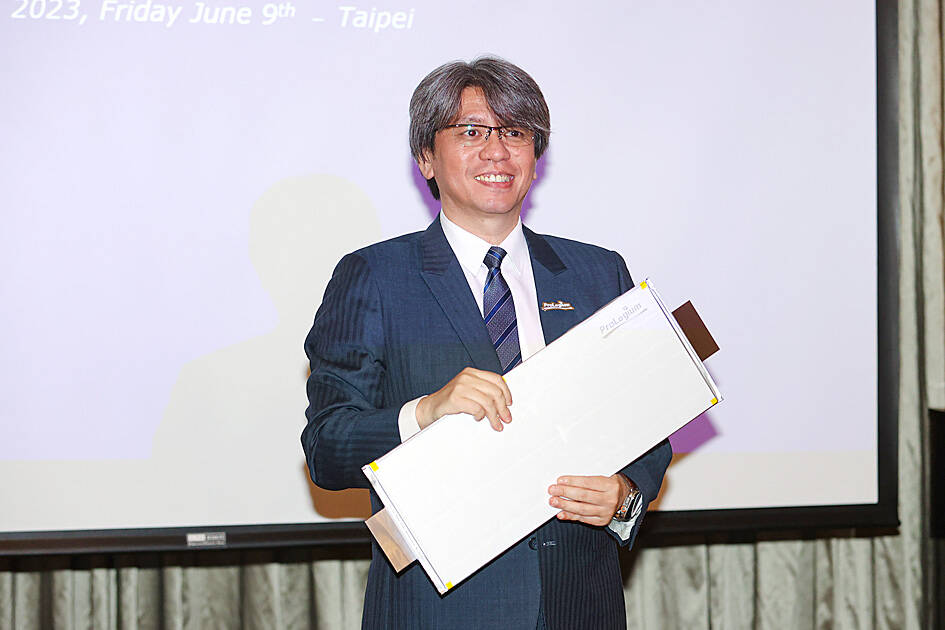Electric vehicle (EV) battery maker ProLogium Technology Co (輝能科技) would continue to expand its operations in Taiwan despite announcing it would build a new “gigafactory” in France, company founder and chief executive officer Vincent Yang (楊思枏) said yesterday.
“It is clear that we are rooted in Taiwan, and [we are] expanding overseas on a foundation built in Taiwan,” Yang told a news conference cohosted by the French Office in Taipei.
The company’s first gigafactory in Taoyuan would be ready for mass production at the end of this year, he said, adding that it would be a “demonstration model” as ProLogium seeks to expand its production overseas.

Photo: CNA
ProLogium has doubled its workforce in Taoyuan to more than 800 over the past year and that number is expected to surpass 1,000 by the end of the year, he said.
Yang last month announced an investment of US$5.7 billion in France.
The solid-state battery manufacturer founded in Taiwan in 2006 would build a plant with production capacity of 48 gigawatt-hours, and a research and development center in Dunkirk in northern France, which is where several EV makers and battery solution providers are based.
By expanding its presence in France, ProLogium would be able to provide batteries to EV and non-EV manufacturers in Europe, and get easier access to raw materials provided by European suppliers, Yang said
Construction of the gigafactory in Dunkirk, which is to be ProLogium’s first overseas plant, is expected to start next year, with production of next-generation batteries projected to begin in 2027.
He declined to provide details on the subsidies to be provided by the French government, saying talks on the issue were still being finalized.
Jean-Francois Casabonne-Masonnave, head of the French Office in Taipei, said that Paris has always provided subsidies to foreign companies investing in France in accordance with EU law.
Francois Cotier, director of Business France Taiwan, later told reporters that France welcomes Taiwanese investment in the nation, especially investment focused on biotechnology, e-mobility and other advanced technologies.

TRADE WAR: Tariffs should also apply to any goods that pass through the new Beijing-funded port in Chancay, Peru, an adviser to US president-elect Donald Trump said A veteran adviser to US president-elect Donald Trump is proposing that the 60 percent tariffs that Trump vowed to impose on Chinese goods also apply to goods from any country that pass through a new port that Beijing has built in Peru. The duties should apply to goods from China or countries in South America that pass through the new deep-water port Chancay, a town 60km north of Lima, said Mauricio Claver-Carone, an adviser to the Trump transition team who served as senior director for the western hemisphere on the White House National Security Council in his first administration. “Any product going

High above the sparkling surface of the Athens coastline, the cranes for building the 50-floor luxury tower centerpiece of Greece’s future “smart city” look out over the Saronic Gulf. At their feet, construction machinery stirs up dust. Its backers say the 8 billion euro (US$8.43 billion) project financed by private funds is a symbol of Greece’s renaissance after the years of financial stagnation that saw investors flee the country. However, critics see it more as a future “ghetto for the rich.” It is hard to imagine that 10km from the Acropolis, a new city “three times the size of Monaco”

STRUGGLING BUSINESS: South Korea’s biggest company and semiconductor manufacturer’s buyback fuels concerns that it could be missing out on the AI boom Samsung Electronics Co plans to buy back about 10 trillion won (US$7.2 billion) of its own stock over the next year, putting in motion one of the larger shareholder return programs in its history. South Korea’s biggest company would repurchase the stock in stages over the coming 12 months, it said in a regulatory filing on Friday. As a first step, it would buy back about 3 trillion won of paper starting today up until February next year, all of which it would cancel. The board would deliberate on how best to effect the remaining 7 trillion won of buybacks. The move

In a red box factory that stands out among the drab hills of the West Bank, Chat Cola’s employees race to quench Palestinians’ thirst for local products since the Gaza war erupted last year. With packaging reminiscent of Coca-Cola’s iconic red and white aluminum cans, Chat Cola has tapped into Palestinians’ desire to shun brands perceived as too supportive of Israel. “The demand for [Chat Cola] increased since the war began because of the boycott,” owner Fahed Arar said at the factory in the occupied West Bank town of Salfit. Julien, a restaurateur in the city of Ramallah further south,